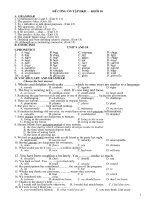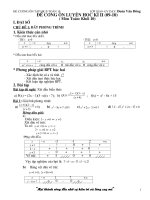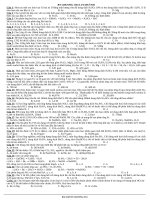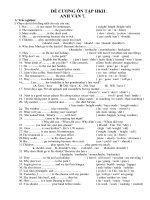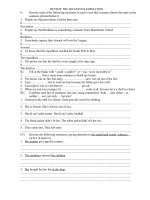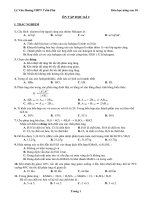ĐỀ CƯƠNG ÔN TẬP HKII ANH 10
Bạn đang xem bản rút gọn của tài liệu. Xem và tải ngay bản đầy đủ của tài liệu tại đây (263.63 KB, 11 trang )
Page1
ÔN
TẬP
H
Ọ
C
KÌ
II
-
MÔN
TI
Ế
NG
ANH
10
C
Ơ
BẢN
A /
A
c ce
nt
m a r
k:
D
ấ
u
nh
ấ
n/
Trọng
âm
1.
ð
ối
với
những
từ
gồm
có
2
hoặc
3
vần,
trọng
âm
thường
rơi
v
ào v
ầ
n
ñ
ầ
u .
Ex:
rísky,
flóra,
áudience,
cháracter,
2.
ð
ối
với
những
từ
gồm
có
4
vần
(hoặc
nhiều
hơn),
trọng
âm
thường
rơi
vào
vần
thứ
3
k ể
t
ừ
c
u ố i .
Ex:
minórity,
metropólitan,
commúnicate,
varíety,
3.
ð
ối
với
những
từ
tận
cùng
có
các
vần
như:
-ion,
-ic,
-ian,
trọng
âm
thường
rơi
vào
v
ầ
n
phía t r
ư
ớ
c
.
Ex:
emótion,
competítion,
scientífic,
photográphic,
olýmpic,
electrícian,
Confúcian,
4.
ð
ối
với
những
từ
tận
cùng
có
các
vần
như:
-oo,
-oon,
-ee,
-een,
-eer,
-ese,
-ette,
trọng
âm
thường
rơi
vào
ngay
c
ác v
ầ
n
n ày .
Ex:
bambóo,
shampóo,
cartóon,
afternóon,
referée,
employée,
cantéen,
thirtéen,
enginéer,
Vietnamése,
Chinése,
cigarétte,
5.
đ
ối
với
những
từ
có
các
tiền
tố
(tiếp
ñầu
ngữ)
như:
in-,
im-,
ir-,
re-,
pre-,
dis-,
de-,
be-,
ex-,
en-,
trọng
âm
thường
rơi
vào
v
ầ
n ph í
a s
a u .
Ex:
insíde,
impóssible,
irrégular,
repéat,
prevíew,
discúss,
deféat,
begín,
excíted,
enjóy,
represént,
indepéndent,
B
/
S ou n
d :
Phát
âm
1.
Chú
ý
các
phụ
âm
ñã
học
trong
SGK
từ
Unit
9-
16.
2.
đ
ộng
từ
tận
cùng
bằng
-ED
có
3
cách
phát
âm
là:
/id/,
/t/,
/d/.
a.
ð
ối
với
những
ñộng
từ
tận
cùng
là:
-t,
-d,
khi
thêm
-ED
sẽ
phát
âm
là
/id/.
Ex:
wanted,
collected,
decided,
needed,
b.
ð
ối
với
những
ñộng
từ
tận
cùng
là:
-c,
-f,
-k,
-p,
-s,
-x,
-sh,
-ch,
khi
thêm
-ED
sẽ
phát
âm
là
/t/.
Ex:
practiced,
stuffed,
looked,
stopped,
missed,
fixed,
washed,
watched,
c.
đ
ối
với
những
ñộng
từ
tận
cùng
là
các
ph
ụ
âm
còn
l
ạ
i
ho
ặ
c
nguyên
âm,
khi
thêm
-ED
sẽ
phát
âm
là
/d/.
Ex:
enjoyed,
stayed,
managed,
cleaned,
arrived,
called,
3.
ð
ộng
từ/
danh
từ
tận
cùng
bằng
-S
có
2
cách
phát
âm
là:
/s,
/z/.
a.
ð
ối
với
những
ñộng
từ/
danh
từ
tận
cùng
là:
-p,
-f,
-th,
-k,
-t
khi
thêm
-S
sẽ
phát
âm
là
/s/.
Ex:
stops,
books,
cuts,
months,
roofs,
b.
ð
ối
với
những
ñộng
từ/
danh
từ
tận
cùng
là
các
ph
ụ
âm
còn
l
ạ
i
ho
ặ
c
nguyên
âm,
khi
thêm
-S
sẽ
phát
âm
là
/z/.
Ex:
enjoys,
stays,
dogs,
pens,
tables,
lives,
C /
G r
am m a r
:
Ng
ữ
pháp
I .
C
on d i
t ional
s e
n t e
n c
e
s ( I
f se
n t e
n ce
s) :
1.
C
o n d i
tional
s e
nt e
n ce
:
T y
pe 2:
Câu
ñiều
kiện
loại
2
a.
If
+
S
+
V2/ed
(be
were)
… ,
S
+
would/
could
+
Vo
…
b.
Diễn
tả
một
ñiều
kiện
KHÔNG
THể
XÃY
RA
ở
hiện
tại.
Ex:
I
don’t
have
free
time,
so
I
can’t
help
him.
If
I
h a
d
free
time,
I
w
ould
h e
lp
him.
2.
C
o n d i
tional
s e
nt e
n ce
:
T y
pe 3:
Câu
ñiều
kiện
loại
3
a.
If
+
S
+
had
+
V3/ed
… ,
S
+
would/
could
+
have
+
V3/ed
…
b.
Diễn
tả
một
ñiều
kiện
KHÔNG
THỂ
XÃY
RA
trong
quá
khứ.
Ex:
I
didn’t
have
free
time,
so
I
couldn’t
help
him.
If
I
h a
d h a
d
free
time,
I
w
ould h a
v e
h e l p e
d
him.
I I
.
P a ss
i v e
vo i c
e
:
Thể
bị
ñộng
Active: S + V + O (place) (time)
Passive: S
+
BE
+
V3/ed
+
(place)
+
(by
O)
+
(time)
Active Passive
S
+
V1
+
O S
+
am/is/are
+
V3/ed
S
+
am/is/are
+
V-ing
+
O S
+
am/is/are
+
being
+V3/ed
Wh-
words hỏi
về
Who
What/
Which
When
Where
Why
How
How
old
How
far
How
often
How
much/
many
người
vật
thời
gian
nơi
chốn
lí
do
thể
cách
(như
thế
nào)
tuổi
khoảng
cách
bao
lâu
1
lần
số
lượng
(bao
nhiêu)
S
+
has/have
+
V3/ed
+
O S
+
has/have
+
been
+
V3/ed
S
+
V2/ed
+
O S
+
was/were
+V3/ed
S
+
was/were
+
V-ing
+
O S
+
was/were
+
being
+V3/ed
S
+
had
+
V3/ed
+
O S
+
had
+
been
+
V3/ed
S
+
will/shall
+
Vo
+
O S
+
will/shall
+
be
+V3/ed
Ex:
-
Active:
She
arranges
the
books
on
the
shelves
every
weekend.
Passive:
The
books
a
r e
a
rr a
n g e
d
on
the
shelves
(by
her)
every
weekend.
-
Active:
They
have
built
a
new
bridge
across
the
river.
Passive:
A
new
bridge
h a
s b e e
n built
across
the
river
(by
them).
-
Active:
Mai
was
watching
a
cartoon
at
8
o’clock
last
night.
Passive:
A
cartoon
w a
s b e
ing
w a
t c
h e
d
by
Mai
at
8
o’clock
last
night.
I II
/
t o
+ in f ini t i
v e
:
ñộng
từ
nguyên
mẫu
có
to
Ex:
I
listen
to
classical
music
to f
e e
l
relaxed.
(I
listen
to
classical
music
t
o fee
l/
in
order
to f
ee
l
/ s
o a
s to fe
e
l
relaxed).
IV/
Wh-
questions:
1/
Với
ñộng
từ
“to
be”:
Wh-
+
be
+
S
(+
…)?
Ex:
What
is
the
time?
–
It’s
7.
2/
Với
ñộng
từ
khiếm
khuyết:
can, could, will,
would,
shall,
should,
may,
might,
must,
ought
to
Wh-
+
KK
+
S
+
V
(+
…)?
Ex:
How
many
languages
can
you
speak?
–
3.
3/
Với
ñộng
từ
thường:
Wh-
+
do/does/did
+
S
+
V
(+
…)?
Ex:
Where
did
you
go
yesterday?
–
I
went
to
the
bookstore.
V .
A
d j ec
t i
ve of
a tt i t ud e
:
Tính
từ
chỉ
thái
ñộ
-ed/
-ing
Ex:
I
am
in t e
r es
t e
d
in
the
film.
The
film
made
me
in t
e
r es
t e
d .
Ex:
I
find
the
film
very
int e
r es
tin g .
The
film
is
very
int e
r es
tin g .
It
is
an
i
n t e
r e
s t
ing
film.
V I
.
I
t w
as not un t il……
t h at
……:
Mãi
ñến
khi……
thì………
It
was
not
until
+
time/
S
+
V2/ed……
that
+
S
+
V2/ed……
Ex:
The
cinema
did
not
become
an
industry
until
1915.
It
was
not
until
1915
that
the
cinema
b eca
m e
an
industry.
Ex:
He
didn’t
know
how
to
swim
until
he
was
30.
It
was
not
until
he
was
30
that
he
kn e
w
how
to
swim.
V II
.
a/ a n ,
t h e
:
1.
a/
an:
ñược
dùng
khi
người/vật
ñược
ñề
cập
LẦN
ð
ẦU
TIÊN.
“AN”
ñứng
trước
nguyên
âm
(a,
o,
e,
u,
i)
Ex:
I
have
a
pencil
and
a n
eraser.
2.
th e
:
Khi
người/vật
ñó
ñược
nhắc
ñến
kể
từ
LẦN
THỨ
HAI,
hoặc
ñược
xác
ñịnh
qua
ngữ
cảnh.
Ex:
-
I
have
a
pencil
and
a
n
eraser.
T he
pencil
costs
3,500
VND
and
t h e
eraser
is
2,000
VND.
-
The
title
of
the
film
is
Titanic.
V II
I . w
i l
l v s .
be
g o ing
t o:
1.
b e
going
to:
diễn
tả
một
dự
ñịnh.
Ex:
A:
Why
are
you
turning
on
the
TV?
-B:
I’m
g oing t
o
w a
t c
h
the
news.
2.
W i
l l:
diễn
tả
một
quyết
ñịnh
ñưa
ra
vào
lúc
nói;
một
phỏng
ñoán,
một
ñề
nghị.
Ex:
A:
I
want
to
buy
this
book
but
I
don’t
have
enough
money.
-B:
I’ll
l e
nd
you
some.
Ex:
You
are
working
very
hard.
I
am
sure
you
w i
ll
p as
s
this
exam
easily.
Ex:
A:
It’s
very
cold.
-B:
I’l
l c
lo s
e
the
windows.
I X .
Re
la t i
v e c
lau se
s :
1.
D e
f ining
r e
lati v
e c
lau s e
s :
M
ð
QH
xác
ñịnh
(WHO,
WHOM,
WHICH,
THAT)
Ex:
I
saw
the
girl.
She
helped
us
last
week.
I
saw
the
girl
w
ho/ t
h a
t
h e
lp e
d us l
a
s t
w ee
k .
Ex:
The
book
is
very
interesting.
I
bought
it
last
week.
The
book
w
hi c
h/ th a
t I
bou g ht
l a
s t w
e e
k
is
very
interesting.
2.
N on - d e
f i
n i
n g
re
lati v e c
l
a u ses
:
M
ð
QH
không
xác
ñịnh
(WHO,
WHOM,
WHICH)
Ex:
My
father
is
a
doctor.
He
is
fifty
years
old.
My
father,
w
ho
is f
i f ty y e
a
r s
old ,
is
a
doctor.
Ex:
New
York
is
a
large
harbour.
It
is
ice-free
in
all
seasons.
New
York,
w
hi c
h
i s i ce
-f r
e e
in a
ll s
e as
on s ,
is
a
large
harbour.
X .
A
l t houg h /
T
hou g
h
v s .
I
n s
pi t e
o f
/ D es
pi t e
:
1.
A lthoug h /
T
h ou g
h:
Although/
Though
+
S
+
V
…….,
S
+
V
…….(
S
+
V
…….although/
though
+
S
+
V
…….)
Ex:
A
lthou g h
New
York
is
not
the
capital
of
the
USA,
it
is
the
centre
of
global
finance.
(New
York
is
the
centre
of
global
finance
a
lt h ough
it
is
not
the
capital
of
the
USA).
2.
I n
s pite
o f /
D es
pit e
:
In
spite
of/
Despite
+
N/
V-ing…,
S
+
V
….(
S
+
V……
in
spite
of/
despite
+
N/
V-ing…….)
Ex:
I n s
pite
o f
not
being
the
capital
of
the
USA,
New
York
is
the
centre
of
global
finance.
(New
York
is
the
centre
of
global
finance
i
n s pi t
e o f
not
being
the
capital
of
the
USA).
Ex:
D es
pi t e
his
age,
he
works
extremely
hard.
(He
works
extremely
hard
d e
s p i
t e
his
age).
I.
PHONETICS
EXERCISES
1.
Choose
the
word
whose
underlined
part
is
pronounced
differently
from
that
of
the
other
words.
1)
A.
he
r e B.
be
ar C.
he
ar D.
engine e
r
2)
A.
four B.
your C.
tour D.
cou r se
3)
A.
se
a food B.
rele
a se C.
thre
a ten D.
bene
a th
4)
A.
climber B.
bomb C.
blue D.
combing
5)
A.
pine B.
psychology C.
plane D.
pick
6)
A.
parke
d B.
watche
d C.
endangere
d D.
stoppe
d
7)
A.
statione
d B.
belonge
d C.
establishe
d D.
studie
d
8)
A.
books B.
students C.
things D.
delights
9)
A.
cuts B.
lives C.
business D.
roles
10)
A.
film B.
of C.
feeling D.
roof
11)
A.
one B.
follow C.
horror D.
across
12)
A.
c
h ampion B.
c
h airman C.
c
h aracter D.
whic
h
13)
A.
c
up B.
bec
ome C.
c
onsider D.
c
ity
14)
A.
somet
h ing B.
think C.
without D.
t
h ank
15)
A.
those B.
they C.
themselves D.
t
h eatre
2.
Choose
the
word
that
has
stress
pattern
different
from
that
of
the
other
words.
16)
A.
various B.
divide C.
challenge D.
picture
17)
A.
activity B.
investigate C.
century D.
diversity
18)
A.
oversize B.
satellite C.
existence D.
plastic
19)
A.
conservation B.
variety C.
reconstruction D.
circulation
20)
A.
disease B.
cancer C.
sickness D.
visit
21)
A.
endanger B.
recognize C.
special D.
tropical
22)
A.
locate B.
contain C.
water D.
exist
23)
A.
language B.
music C.
feelings D.
convey
24)
A.
mournful B.
express C.
emotion D.
modern
25)
A.
history B.
movement C.
cinema D.
develop
26)
A.
character B.
industry C.
position D.
audience
27)
A.
tournament B.
passionate C.
popular D.
retirement
28)
A.
region B.
attract C.
football D.
final
29)
A.
unusual B.
interesting C.
different D.
capital
30)
A.
museum B.
gallery C.
ideal D.
develop
II.
VOCABULARY
Choose
the
best
answer
to
complete
each
sentence.
1)
The
United
Kingdom
is
divided
…………….……….
4
parts:
England,
Scotland,
Wales
and
Northern
Ireland.
A.
between B.
among C.
into D.
for
2)
Carnivores
are
animals
which
………………………….
.
A.
eat
meat B.
eat
plants C.
swim
very
fast D.
live
on
the
bottom
3)
The
sea
is
polluted,
which
……………………
sea
plants
and
animals.
A.
dangers B.
dangerous C.
dangerously D.
endangers
4)
The
starfish
live
on
or
depend
………………………
the
bottom.
A.
in B.
for C.
on D.
of
5)
The
life
…………….……
of
sperm
whale
can
be
up
to
seventy
years.
A.
period B.
length C.
distance D.
span
6)
Hydroelectric
dams
in
Vietnam
have
provided
power
… ……
millions
of
homes
and
businesses.
A.
for B.
to C.
with D.
of
7)
Trees
and
shrubs
…….…………………….
an
important
part
in
preserving
land.
A.
make B.
keep C.
have D.
play
8)
New
York
is
famous
…………………………….
its
skyscrapers.
A.
as B.
with C.
for D.
of
9)
Without
plants,
most
water
would
………………………….
as
soon
as
it
falls.
A.
run
off B.
run
after C.
run
away D.
run
by
10)
Wildlife
all
over
the
world
is
in
…………………………
.
A.
risk B.
danger C.
threat D.
death
11)
My
home
village
is
………………………
40
kilometres
north
of
the
capital.
A.
held B.
laid C.
located D.
surrounded
12)
We
were
very
……………………………
at
his
success.
A.
surprised B.
interested C.
keen D.
fond
13)
There
is
a
large
……………………
of
animals
that
live
in
Nairobi
National
Park.
A.
vary B.
various C.
varied D.
variety
14)
Cuc
Phuong
National
Park
…………….…….
over
200
square
kms
of
rainforest.
A.
contains B.
holds C.
gets D.
covers
15)
The
……………………….
has
threatened
many
of
the
animals
in
this
park.
A.
population B.
remain C.
increase D.
contamination
16)
Van
Cao
is
a
well-known
……………….
.
A.
band B.
music C.
musician D.
song
17)
Jack
Dawson
is
a
p e
r s
on i
n t h e fi
lm
Titanic.
A.
decade B.
character C.
cinema D.
scene
18)
If
you
know
English,
you
can
with
people
in
the
world.
A.
entertain B.
communicate C.
lull D.
delight
19)
Tom
and
Jerry
is
a(n)
film.
A.
action B.
science
fiction C.
love
story D.
cartoon
20)
Music
can
……………ideas,
thoughts
and
feeling.
A.
play B.
express C.
talk D.
compose
21)
World
Cup
is
consider
the
most
popular
event
in
t h e
w
o r l d .
A.
the
continent B.
the
region C.
the
globe D.
the
nation
22)
I
………… thriller
films
to
action
films.
A.
enjoy B.
like C.
would
rather D.
prefer
23)
Which
do
you
prefer.
Action
films
………………………
love
stories?
A.
but B.
and C.
with D.
or
24)
Germany
was
the
…………………
of
the
2006
World
Cup.
The
18
th
World
Cup
was
held
there.
A.
trophy B.
host
nation C.
continent D.
tournament
25)
The
World
Cup
is
c
on s i
d e
r e
d
the
most
popular
sporting
event
in
the
world.
A.
competed B.
regarded C.
witnessed D.
organized
26)
In
the
final
match,
our
school
team
defeated
the
visiting
team
by
4……………
3.
A.
against B.
with C.
up D.
to
27)
Our
actions
e
xp r e
s s
our
love
more
than
any
words
we
do.
A.
perform B.
show C.
create D.
help
28)
Films
have
been
around
for
more
than
a
c e
ntu r y .
A.
one
thousand
years B.
one
hundred
years
C.
a
year D.
ten
years
29)
……………….
traditional
music
of
a
country.
A.
Pop
music B.
Jazz C.
Folk
music D.
Classical
music
30)
Uruguay
defeated
Argentina
in
the
final
match
and
became
the
first
…………….….…in
history
of
the
World
Cup.
A.
victory B.
champion C.
championship D.
hero
31)
My
village
is
located
………….………………
the
western
part
of
the
city.
A.
at B.
in C.
of D.
on
32)
New
York
was
…………………………
by
the
Dutch
in
1624.
A.
found B.
finding C.
founded D.
finded
33)
London
……………………………
an
area
of
1610
square
kilometers.
A.
have B.
gets C.
covers D.
fills
34)
This
is
the
oldest
building
………….………………
the
village.
A.
in B.
of C.
by D.
to
35)
There
are
…………………………
tall
offices
and
apartment
buildings
in
New
York.
A.
hundred B.
hundreds C.
hundred
of D.
hundreds
of
III.
GRAMMAR
Choose
the
best
answer
among
A,
B,
C
or
D
that
best
completes
each
sentence.
1)
Why
didn't
you
go
camping
last
week?
If
you
there,
you
would
have
had
a
lot
of
fun.
A.
were
being B.
have
been C.
had
been D.
was
being
2)
What
if
you
had
had
a
day
off
yesterday?
A.
would
you
have
done B.
would
you
do
C.
will
you
do D.
you
would
have
done
3)
If
I
you,
I
wouldn't
accept
the
invitation.
A.
had
been B.
were C.
are D.
has
been
4)
He
would
visit
us
if
he
in
town.
A.
will
be B.
was C.
were D.
would
be
5)
If
you
didn't
stay
up
late,
you
get
up
earlier.
A.
can B.
could C.
will D.
can
6)
If
I
heard
from
Jack,
I
let
you
know.
A.
will B.
would C.
shall D.
had
7)
If
I
knew
her
number,
I
her.
A.
phone B.
will
phone C.
would
phone D.
had
phoned
8)
If
they
were
rich,
they
buy
a
castle.
A.
will B.
can C.
would D.
were
able
to
9)
If
you
this
glass,
you
would
have
to
pay
for
it.
A.
broke B.
break C.
have
broken D.
had
broke
10)
If
you
French,
which
language
would
you
study?
A.
were
studying B.
are
studying C.
weren’t
studying D.
have
been
studying
11)
The
road
in
front
of
your
house
A.
repairs B.
is
preparing C.
is
being
repaired D.
repairing
12)
When
we
arrived,
the
winner
of
the
art
competition
a
prize.
A.
awarded B.
were
being
awarded
C.
was
awarding D.
was
being
awarded
13)
When
we
came,
the
stadium
A.
was
being
filled B.
has
filled C.
filled D.
is
being
filled
14)
New
machines
used
on
this
farm.
A.
have B.
are
being C.
being D.
were
being
15)
The
examinations
next
month.
A.
will
give B.
will
have
given C.
would
have
given
D.
will
be
given
16)
I
went
to
the
library
last
night.
A.
for
studying B.
studying C.
to
study D.
to
studying
17)
It
was
not
until
1980
that
they
to
learn
English.
A.
began B.
begin C.
didn’t
begin D.
to
begin
18)
I
got
envelop
this
morning.
There
was
500.000$
in
………………….
envelop.
A.
the/
the B.
a/
an C.
a/
the D.
an/
the
19)
………………
did
you
buy
this
book?
–
I
bought
it
yesterday.
A.
When B.
What C.
Why D.
Who
20)
They
have
just
bought
some
paint.
They
……………………
their
house
this
afternoon.
A.
be
going
to
paint B.
will
paint C.
to
painting D.
are
going
to
paint
21)
Yesterday
she
heard
…………….
news.
She
was
so
………………
that
she
couldn’t
say
anything.
A.
surprising/
surprising B.
surprised/
surprising
C.
surprising/
surprised D.
surprised/
surprised
22)
I
do
not
think
Robert
……………………
the
gold
medal.
A.
is
going
to
win B.
is
winning C.
will
win D.
won’t
win
23)
Peter
has
practiced
playing
the
piano
……………………
the
piano
contest
next
week.
A.
in
order
enter B.
to
entering C.
to
enter D.
to
not
enter
24)
………………
you
stay
there?
–
I
spent
three
wonderful
weeks
there.
A.
How
long B.
How
far C.
How
much D.
How
often
25)
It
was
not
until
I
was
15
years
old
that
I
………… how
to
ride
a
bicycle.
A.
learned B.
had
learned C.
was
learning D.
is
learning
26)
It
is
an
…………………game.
A.
excitement B.
exciting C.
excited D.
excite
27)
……………
are
you
learning
Chinese
for?
–
To
sing
Chinese
songs.
A.
When B.
Where C.
What D.
Why
28)
.
……………earth
moves
round
……………… sun.
A.
The
/
the B.
A
/
a C.
An
/
the D.
An
/
an
29)
He
is
very
…………………….in
my
story.
A.
interestingly B.
interest C.
interesting D.
interested
30)
She
took
a
bus
……………………….be
late.
A.
in
order
to
not B.
to
not C.
so
as
not
to D.
A
&
C
31)
We
are
going
to
visit
Ha
Noi,
………………………………
is
the
capital
of
Vietnam.
A.
which B.
that C.
where D.
Ø
32)
…………………………….
living
in
the
country,
Mr.
Lam
is
working
in
the
city.
A.
Although B.
Despite C.
In
spite D.
But
33)
I
couldn’t
sleep
……………………………….
very
tired.
A.
although
I
was B.
despite
I
was C.
in
spite
of D.
despite
of
being
34)
We
know
a
lot
of
people
……………………………….
live
in
London.
A.
which B.
that C.
whom D.
whose
35)
I
enjoy
living
in
the
city
…………………………….
everything
is
expensive.
A.
although B.
but C.
despite D.
in
spite
of
IV.
WRITING
1.
Choose
the
underlined
part
among
A,
B,
C
or
D
that
needs
correcting.
1)
What
would
y ou
d o
if
you
h a
v e
chance
to
t r a
v e
l
in
the s ub m
a
r i n e
?
A B C D
2)
If
I
had
kno w
n
that
you
w e
r e
ill ,
I
h a
d
g one
to
s e
e y ou
A B C D
3)
H a
v e
the
students
b e t
old
about
the
c
h a
n g e
s of
their
timetable
y e
t ?
A B C D
4)
You
should
b r ing
an
umbrella
in
o r d e
r
p r ot ec
t
yourself
from
r a
i
n .
A B C D
5)
W
h e
n
does
your
daughter
p r a
c t i
c e
singing
a
l l
day
for?
–
t
o b e
c
o m e
a
singer.
A B C D
6)
Why
w e
don ’ t
go
to
the
cinema
f
or
a
c
h a
n g e
tonight?
A B C D
7)
The
students
w e
r e
i nt e
r es
t ing
in
t a
k i
ng
a f
i e
l d t
r ip
to
the
National
Museum.
A B C D
8)
It
was
not
until
his
father
came
home
w
hi c
h
he
did
his
ho m e
w o r k .
A B C D
9)
You’d
b e
t
t e
r
visit
Hue,
w hi c
h
used
t
o be
a
capital
of
Vietnam.
A B C D
10)
C a
n
you
call
me
a t
7,00
b e
c a
u s e
I
w
i l
l l ea
v e
tomorrow?
A B C D
11)
T h e
r e
’ s
someone
a
t
the
door.
A
r e
y ou
g o i
n g t
o
o p e
n
the
door
f
or m e
?
A B C D
12)
M y
bi k e
,
w hom
I
l e f
t
at
the
gate,
h a
d d i
s a
pp ea
r e
d .
A B C D
13)
I n
s
p i t
e o f
the
car
wa
s
cheap,
i
t
was
in
good
condition.
A B C D
14)
It
was
s u r p r i
s e
d
to
see
my
old
f r
i e
nds
again
a
f t
e
r
a l
ong t i
me .
A B C D
15)
My
bo y f
r i e
n d ,
wh i
c
h
hates
country
music,
r e
f
u s e
d
to
go
to
t
h e
concert
with
me.
A B C D
2.
Choose
the
correct
sentence
that
best
rewrites
the
root
one:
16)
I
have
to
work
tomorrow
evening,
so
I
can’t
meet
you.
A.
If
I
have
to
work
tomorrow
evening,
I
can
meet
you.
B.
If
I
didn’t
have
to
work
tomorrow
evening,
I
would
meet
you.
C.
I
could
meet
you
tomorrow
evening
if
I
don’t
have
to
work.
D.
I
can
meet
you
if
I
didn’t
have
to
work
tomorrow
evening.
17)
People
must
not
leave
bicycles
in
the
hall.
A.
Bicycles
must
not
be
left
in
the
hall. B.
Bicycles
in
the
hall
must
not
being
left.
C.
Bicycles
in
the
hall
must
not
left. D.
Bicycles
must
been
not
left
in
the
hall.
18)
Dangerous
driving
causes
many
accidents.
A.
Causes
many
accidents
are
being
driven
by
dangerous.
B.
Accidents
are
caused
by
many
dangerous
driving.
C.
Many
accidents
are
caused
by
dangerous
driving.
D.
Many
are
caused
accidents
by
dangerous
driving.
19)
He
didn’t
work
hard,
so
he
failed
the
exam.
A.
If
he
worked
hard,
he
wouldn’t
fail
the
exam.
B.
If
he
hadn’t
worked
hard,
he
would
have
failed
the
exam.
C.
He
wouldn’t
have
failed
the
exam
if
he
had
worked
hard.
D.
He
hadn’t
failed
the
exam
if
he
would
have
worked
hard.
20)
I
was
tired
because
I
stayed
up
late
last
night.
A.
If
I
hadn’t
stayed
up
late
last
night,
I
wouldn’t
have
been
tired.
B.
I
hadn’t
been
tired
if
I
wouldn’t
have
stayed
up
late
last
night.
C.
If
I
had
stayed
up
late
last
night,
I
would
have
been
tired.
D.
I
wouldn’t
be
tired
if
I
didn’t
stay
up
late
last
night.
21)
I
am
going
to
the
capital.
I
wanted
to
find
a
good
job.
A.
I
am
going
to
the
capital
to
finding
a
good
job.
B.
I
am
going
to
the
capital
will
find
a
good
job.
C.
I
am
going
to
the
capital
for
finding
a
good
job.
D.
I
am
going
to
the
capital
to
find
a
good
job.
22)
Why
are
you
saving
money?
A.
What
reasons
are
you
saving
money? B.
For
what
are
you
saving
money?
C.
What
kind
of
money
are
you
saving? D.
What
are
you
saving
money
for?
23)
John
finds
astronomy
very
interesting.
A.
John
is
interested
in
astronomy.
B.
Astronomy
is
one
of
John’s
favourite
branches
of
science.
C.
John
reads
a
lot
of
books
about
astronomy.
D.
Astronomy
makes
John
become
more
interested
in
science.
24)
She
didn’t
write
to
him
until
she
received
his
letter.
A.
It
was
not
until
she
received
his
letter
that
she
wrote
to
him.
B.
It
was
not
until
she
received
his
letter
which
she
wrote
to
him.
C.
It
was
not
until
she
write
to
him
that
she
received
his
letter.
D.
It
was
not
until
she
receive
his
letter
that
she
write
to
him.
25)
We
didn’t
recognize
him
until
he
came
into
the
light.
A.
It
was
not
until
we
recognized
him
that
he
came
into
the
light.
B.
It
was
not
until
he
came
into
the
light
that
we
recognized
him.
C.
It
was
not
until
we
didn’t
recognize
him
that
he
came
into
the
light.
D.
It
was
not
until
he
came
into
the
light
that
we
didn’t
recognize
him.
26)
I
haven’t
had
enough
lessons
for
my
driving
test
tomorrow.
A.
I
think
I
will
going
to
fail
my
driving
test
tomorrow.
B.
I
think
I
will
fail
my
driving
test
tomorrow.
C.
I
think
I
have
failed
my
driving
test
tomorrow.
D.
I
think
I
am
going
to
fail
my
driving
test
tomorrow.
27)
We
stayed
in
Asia
Hotel.
Mr.
Thanh
recommended
it
to
us.
A.
We
stayed
in
Asia
Hotel,
which
Mr.
Thanh
recommended
to
us.
B.
Mr.
Thanh
stayed
in
Asia
Hotel,
which
we
recommended
to
us.
C.
We
stayed
in
Asia
Hotel,
which
Mr.
Thanh
recommended
it
to
us.
D.
We
which
Mr.
Thanh
recommended
to
us
stayed
in
Asia
Hotel.
28)
He
dislikes
big
cities.
He
is
moving
to
London
next
month.
A.
Although
disliking
big
cities,
he
is
moving
to
London
next
month.
B.
Although
he
dislikes
big
cities,
he
is
moving
to
London
next
month.
C.
He
dislikes
big
cities
although
he
is
moving
to
London
next
month.
D.
In
spite
of
he
dislikes
big
cities,
he
is
moving
to
London
next
month.
29)
He
has
good
salary.
He
feels
unhappy.
A.
In
spite
of
having
good
salary
he
feels
unhappy.
B.
Although
having
good
salary
he
feels
unhappy.
C.
Despite
of
having
good
salary
he
feels
unhappy.
D.
In
spite
of
he
has
good
salary,
he
feels
unhappy.
30)
She
is
the
singer.
She
has
just
signed
a
contract
with
a
recording
company.
A.
She
is
the
singer,
who
has
just
signed
a
contract
with
a
recording
company.
B.
She
is
the
singer
which
has
just
signed
a
contract
with
a
recording
company.
C.
She
is
the
singer
who
has
just
signed
a
contract
with
a
recording
company.
D.
She
has
just
signed
a
contract
with
a
recording
company
who
is
the
singer.
V. Choose the best answer among A, B, C or D to complete each sentence:
1. I am teacher.
A. the B. a C. an D. no article
2. My uncle is good engineer.
A. the B. a C. an D. no article
3. That is eraser.
A. the B. a C. an D. no article
4. We are both doctors.
A. the B. a C. an D. no article
5. This is ink pot.
A. the B. a C. an D. no article
6. They are tall.
A. the B. a C. an D. no article
7. Hoa is good pupil.
A. the B. a C. an D. no article
8. That is a bag. It is on table.
A. the B. a C. an D. no article
9. We are in same class.
A. the B. a C. an D. no article
10. Tom is engineer.
A. the B. an C. a D. one
11. There is ink - pot on the desk.
A. the B. a C. an D. some
12. What is color of your pen?
A. the B. a C. an D. any
13. Kate and Mary are going to cinema.
A. the B. a C. an D. no article
14. Do you want me to make reservation for you on ……… next plane to London?
A. the, the B. a, no article C. a, the D. no article, no article
15. What's weather like in winter in your country?
A. the B. a C. an D. no article
16. Please, put these pencils in box.
A. an B. the C. a D. no article
17. Listen to teacher, please. Don't talk in class.
A. the B. a C. an D. no article
18. After dinner, I always wash dishes.
A. an B. a C. the D. no article
19. The new task will not be easy. It will be hard work for you.
A. a B. the C. an D. no article
20. I read two novels week.
A. a B. one C. once D. an
21. shop on Hoang Dieu Street is very large.
A. The B. An C. A D. No article
22. Mrs. Brown parked her car in the parking area of theatre.
A. an B. a C. the D. no article
23. Where can people buy butter and cheese?
A. the B. a C. an D. no article
24. Here is girl we are talking about.
A. a B. an C. the D. no article
25. Her parents are now working in Europe.
A. the B. a C. an D. no article
26. They often go to work at 6 o'clock every morning.
A. an B. a C. the D. no article
27. We live at third house from the church.
A. the B. a C. an D. no article
28. He went to bed with bad cold.
A. the B. an C. a D. some
29. rich should help poor.
A. A, a B. A, the C. The, a D. The, the
30. We plan to go home and have lunch.
A. the, the B. the, a C. a, the D. no article, no article
VI.
READING
Xem
lại
các
ñọc
hiểu
trong
BÀI
TẬP
TRẮC
NGHIỆM
TIẾNG
ANH
10
VÀ
CÁC
ð
Ề
KIỂM
TRA
1
TIẾT.
-SUCCESS
TO
YOU-

